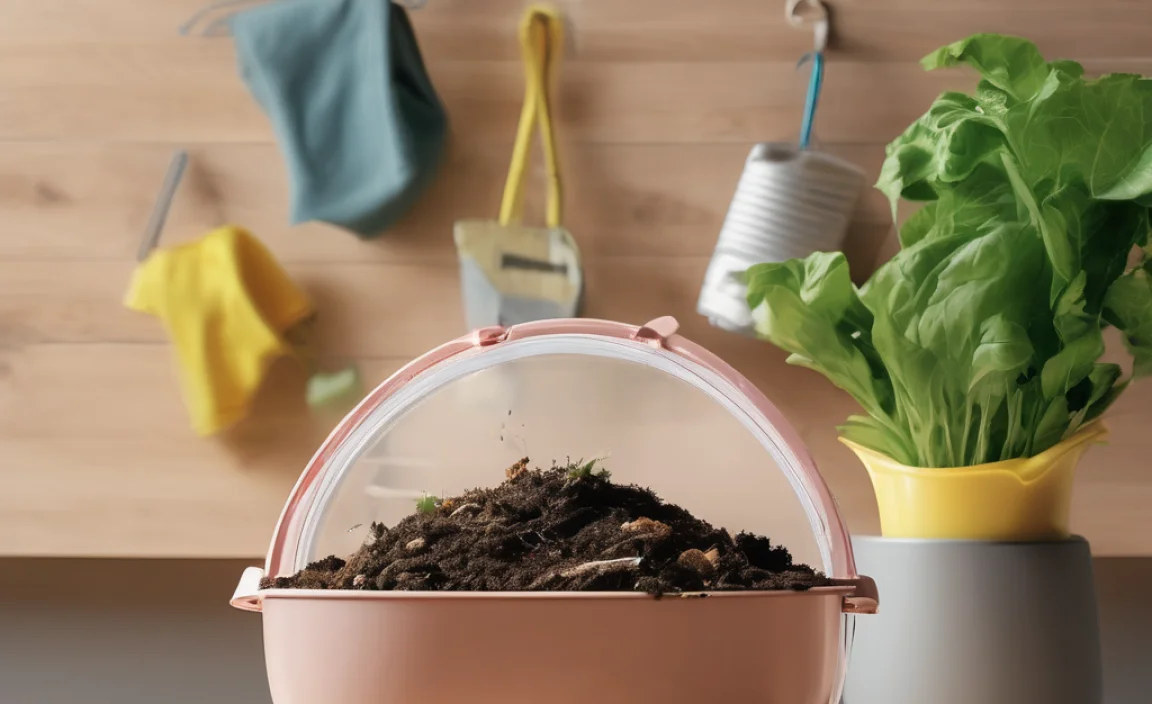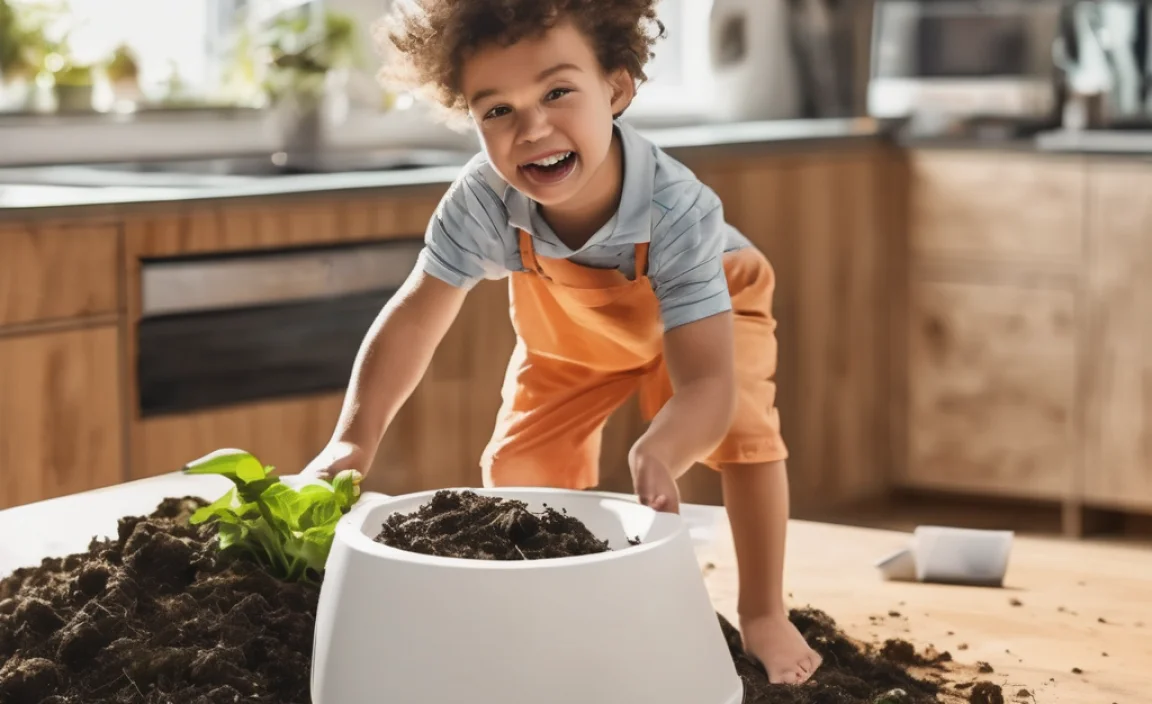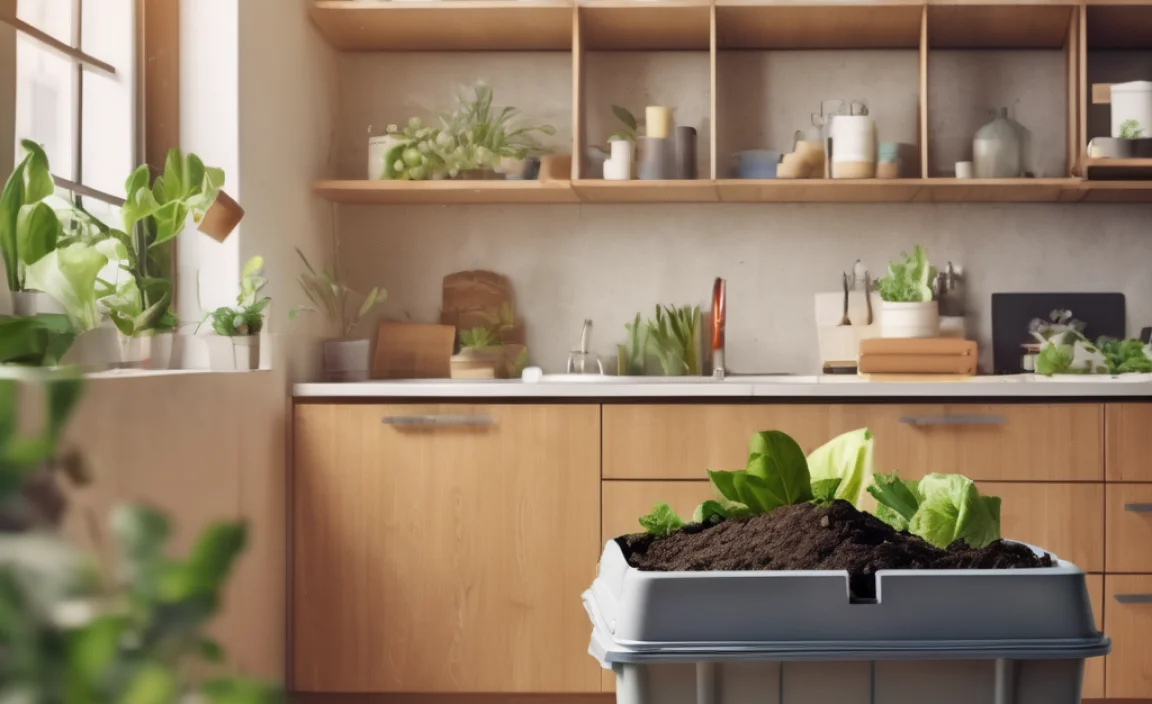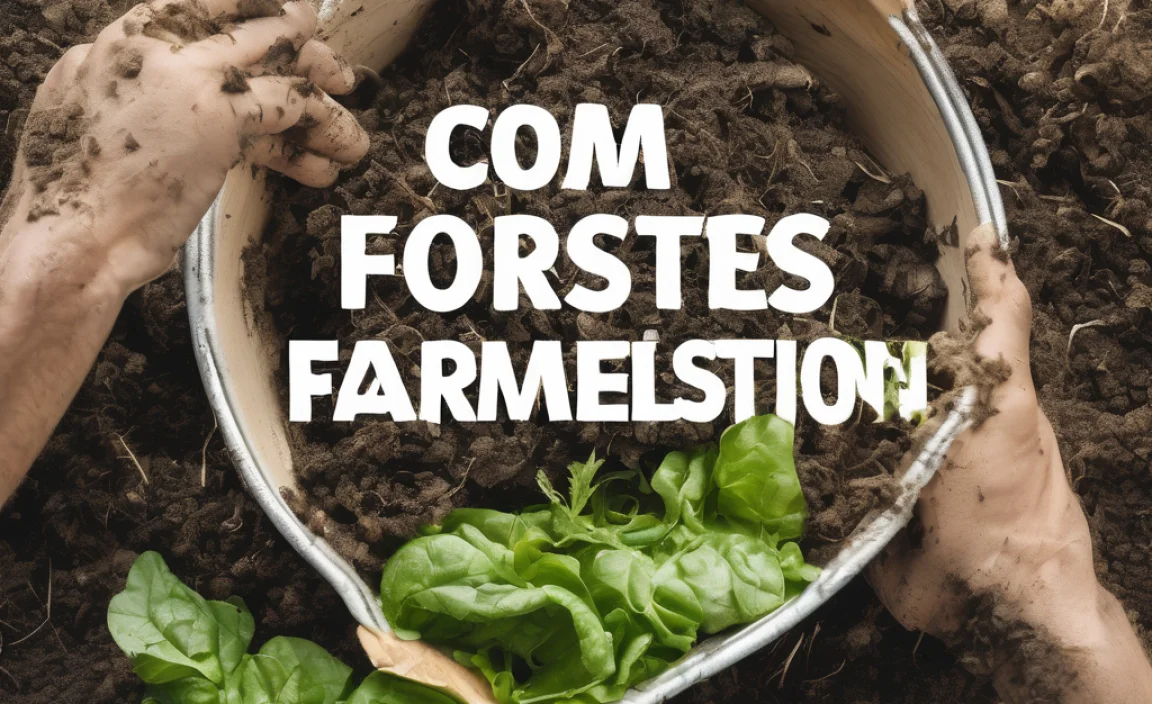Have you ever wondered what happens to leftover food? Is there a way to help the planet from home? Composting for kids in an apartment can be a great start. Composting turns food scraps into dirt. Even if you live in a small space, you can help nature. Let’s find out how!
Key Takeaways
- Composting helps reduce waste in landfills.
- Kids can learn about nature through composting.
- Even apartments can have small composting bins.
- Composting for kids in an apartment is eco-friendly.
- It’s easy to start composting at home.
What is Composting for Kids in an Apartment?

Composting is like magic, turning scraps into soil. In an apartment, you might think it’s tricky. But many kids have fun transforming waste. First, find a small bin or bucket. This will be where you collect your scraps. The goal is to mix food waste with materials like paper. Over time, this mix turns into compost. Kids can watch the changes and learn about nature.
- Use a small bin or bucket.
- Mix food scraps with dry materials.
- Stir or shake once a week.
- Add water sparingly to keep it moist.
- Watch it turn into rich soil.
Composting at home teaches kids about the environment. They see how food waste breaks down. It becomes rich soil that can help plants grow. This small act in an apartment makes a big difference. Kids can feel proud of their efforts. They learn responsibility and care for our planet.
Fun Fact or Stats: Did you know compost can reduce 30% of household waste?
Why Start Composting?
Have you noticed how much food we throw away? Composting helps reduce waste. It turns food into something useful. Kids love seeing scraps transform. It’s like a science project at home. Composting also helps plants grow. When kids see this, they feel like planet heroes. This small act teaches big lessons on caring for Earth.
Choosing the Right Bin
Picking a compost bin is like choosing a pet. It should be easy to care for. Find a bin that fits your apartment. A small one works best. Some bins have lids to keep smells in. Others have holes for air. Kids can decorate their bins. They can draw or use stickers. This makes the bin special and fun.
What Can You Compost?
Not all scraps can go in your bin. But many can! Things like fruit peels and veggie scraps are great. Eggshells and coffee grounds work too. Kids should avoid meat, dairy, and oily foods. These can smell bad. Paper and dry leaves can go in too. They help balance the mix. It’s like following a recipe for great compost.
Easy Steps to Start Composting

Starting composting can be simple and fun. First, pick a spot in your apartment. Maybe near the kitchen. Place your bin there. Start adding food scraps and dry items. Stir or shake the bin weekly. This keeps the compost healthy. Add water if it’s dry. Watch as scraps turn to soil over time.
- Place your bin in a convenient spot.
- Add food scraps and dry materials.
- Stir the bin once a week.
- Add a small amount of water if dry.
- Observe the transformation over time.
Kids can take turns caring for the bin. They learn teamwork and responsibility. Watching the process is exciting. It’s like a mini-laboratory at home. The composting journey is rewarding. It teaches kids the impact they can make. Together, they help make the world greener.
Fun Fact or Stats: Worms in compost bins can eat their weight in food every day!
Creating a Routine
Why is a routine important? It helps kids remember tasks. Set a composting schedule. Maybe every Saturday, check the bin. Kids can add scraps, stir, and water it. This habit makes composting easy. It becomes part of their weekly chores. Over time, they see results. It’s rewarding to watch their efforts grow into compost.
Making it a Family Activity
Composting can be a family activity. Parents and kids work together. Everyone can contribute scraps. Share the responsibility of stirring. Celebrate when the compost is ready. Use it for plants or a garden. Everyone learns and grows together. It’s a great way to bond and teach about the environment.
Tracking Progress
Kids love seeing progress. Keep a compost journal. Write down what goes into the bin. Record any changes. Kids can note when the compost is ready. They become scientists in their own home. This record shows their success. It motivates them to keep going. Watching waste turn to soil is rewarding.
Benefits of Composting for Kids

Composting offers many benefits for kids. They learn responsibility and patience. Watching scraps turn to soil is fascinating. It teaches them about nature and science. Kids see the impact of reducing waste. They feel proud of their efforts. Composting is also fun. Kids enjoy the process and learn valuable skills.
- Teaches responsibility and patience.
- Introduces kids to nature and science.
- Reduces household waste.
- Boosts environmental awareness.
- Encourages problem-solving skills.
Seeing their compost work is exciting for kids. They understand the importance of reducing waste. This knowledge grows with them. Composting is not only about soil. It’s about teaching kids to care for the environment. They become eco-friendly adults. Every little action counts towards a greener planet.
Fun Fact or Stats: Composting can keep 700 pounds of waste out of landfills annually!
Learning Responsibility
Why is responsibility important? It helps kids grow into dependable adults. Composting teaches them this. They have to care for their compost bin. It’s like having a small garden at home. Kids learn to follow steps. They see their efforts pay off. Watching scraps turn to soil is satisfying. It shows them the power of responsibility.
Understanding Science
Composting is like a science experiment. Kids see changes up close. They learn about decomposition. It’s an exciting way to explore science. Kids ask questions and find answers. Why do scraps break down? How does it become soil? They observe and learn. This knowledge is valuable. It fuels their curiosity about the world.
Reducing Waste
Have you ever thought about how much waste we create? Composting reduces this waste. Kids see how their actions matter. Instead of throwing scraps away, they reuse them. This small act makes a big difference. They learn to be eco-friendly. It’s a lesson they carry for life. Reducing waste is an important habit.
Fun Composting Projects and Ideas

Composting can be creative and fun. Kids can try different projects. One idea is to make a worm bin. Worms help break down scraps faster. They can also create a compost poster. This shows what goes in the bin. Kids can decorate their bins. Use paint or stickers. Make it colorful and unique.
- Create a worm bin.
- Make a compost poster.
- Decorate the compost bin.
- Track progress with photos.
- Share compost stories with friends.
Trying new projects keeps composting exciting. Kids love being creative. These activities teach them more about composting. They can share what they’ve learned with others. Kids become leaders in their community. They inspire others to start composting. It’s a fun and rewarding journey.
Fun Fact or Stats: Worms can eat half their weight in food daily!
Making a Worm Bin
Have you ever held a worm? They’re great at composting. Kids can create a worm bin. Use a small container with air holes. Add damp newspaper and worms. Feed them small scraps. Worms speed up composting. Kids watch them work. It’s like having tiny helpers. This project is fun and educational.
Creating a Compost Poster
Posters help kids remember what to compost. They can draw what goes in the bin. Use colorful markers and stickers. Hang the poster near the compost bin. It becomes a helpful guide. Kids check it often. They learn what works best. This visual aid makes composting easier. It’s a tool that teaches and reminds.
Decorating the Bin
Why make the bin special? It encourages kids to use it. They can paint the outside. Add stickers or drawings. Make it personal and fun. A decorated bin feels like their own project. It inspires them to care for it. Kids are proud of their creation. It becomes part of their home and routines.
Conclusion
Composting for kids in an apartment is easy and rewarding. It teaches responsibility and helps the planet. Kids learn about nature in a hands-on way. They watch scraps turn into useful soil. This small act makes a big difference. Encourage kids to start composting today. Together, we can make our world greener.
FAQs
Question: Can you compost in a small apartment?
Answer: Yes, you can! Composting for kids in an apartment is possible. Use a small bin or bucket. Find a spot in your home. Add food scraps and dry materials. It’s a great way to teach kids about the environment.
Question: What scraps are good for composting?
Answer: Many food scraps can be composted. Fruit peels, veggie scraps, and eggshells are great. Avoid meat, dairy, and oily foods. Add paper and dry leaves for balance. This mix turns into rich soil over time.
Question: How can kids learn from composting?
Answer: Composting teaches kids about nature and science. They learn responsibility and patience. Watching scraps turn to soil is exciting. It shows them the impact of reducing waste. Kids gain valuable skills and eco-awareness.
Question: Is composting good for the environment?
Answer: Yes, composting is very good for the environment. It reduces waste in landfills. This helps cut down on greenhouse gases. Composting enriches soil and supports plant growth. Kids learn to help the planet through composting.
Question: Can composting be a family activity?
Answer: Absolutely! Composting can bring families together. Everyone can contribute scraps. Share the responsibility and celebrate results. It’s a great way to bond and learn about the environment. Kids enjoy seeing their efforts make a difference.
Question: What should we avoid composting?
Answer: Avoid composting meat, dairy, and oily foods. These can attract pests and smell bad. Stick to fruit, veggie scraps, and eggshells. Add paper and dry leaves for balance. This helps create healthy and effective compost.
.lwrp.link-whisper-related-posts{
margin-top: 40px;
margin-bottom: 30px;
}
.lwrp .lwrp-title{
}.lwrp .lwrp-description{
}
.lwrp .lwrp-list-container{
}
.lwrp .lwrp-list-multi-container{
display: flex;
}
.lwrp .lwrp-list-double{
width: 48%;
}
.lwrp .lwrp-list-triple{
width: 32%;
}
.lwrp .lwrp-list-row-container{
display: flex;
justify-content: space-between;
}
.lwrp .lwrp-list-row-container .lwrp-list-item{
width: calc(25% – 20px);
}
.lwrp .lwrp-list-item:not(.lwrp-no-posts-message-item){
max-width: 150px;
}
.lwrp .lwrp-list-item img{
max-width: 100%;
height: auto;
object-fit: cover;
aspect-ratio: 1 / 1;
}
.lwrp .lwrp-list-item.lwrp-empty-list-item{
background: initial !important;
}
.lwrp .lwrp-list-item .lwrp-list-link .lwrp-list-link-title-text,
.lwrp .lwrp-list-item .lwrp-list-no-posts-message{
}@media screen and (max-width: 480px) {
.lwrp.link-whisper-related-posts{
}
.lwrp .lwrp-title{
}.lwrp .lwrp-description{
}
.lwrp .lwrp-list-multi-container{
flex-direction: column;
}
.lwrp .lwrp-list-multi-container ul.lwrp-list{
margin-top: 0px;
margin-bottom: 0px;
padding-top: 0px;
padding-bottom: 0px;
}
.lwrp .lwrp-list-double,
.lwrp .lwrp-list-triple{
width: 100%;
}
.lwrp .lwrp-list-row-container{
justify-content: initial;
flex-direction: column;
}
.lwrp .lwrp-list-row-container .lwrp-list-item{
width: 100%;
}
.lwrp .lwrp-list-item:not(.lwrp-no-posts-message-item){
max-width: initial;
}
.lwrp .lwrp-list-item .lwrp-list-link .lwrp-list-link-title-text,
.lwrp .lwrp-list-item .lwrp-list-no-posts-message{
};
}


